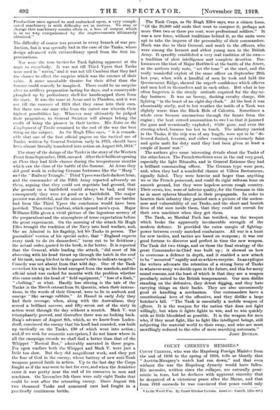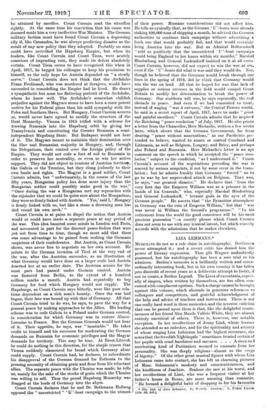COUNT CZERNIN'S MEMOIRS.* COUNT CZERNIN, who was the Hapsburg Foreign
Minister from the end of 1916 to the spring of 1918, tells us bluntly that " Austria-Hungary's watch had run down," and that even without the war the Hapsburg dynasty would have fallen. His memoirs, written since the collapse, are naturally pessimistic in tone, but ho declares with apparent sincerity that he despaired of a victorious peace after the Marne, and that from 1916 onwards he was convinced that peace could only
be attained by sacrifice. Count Czernin read the situation rightly. At the same time his conviction that his cause was doomed made him a. very ineffective War Minister. The German military faction must have found Count Czernin a depressing ally if, like Cassandra, he was always predicting disaster as the result of any new policy that they adopted. Probably no man could have revivified the Hapsburg Empire, but when its leaders, like Count Czernin and Count Tisza, were acutely conscious of impending ruin, they made its defeat absolutely certain. Count Tisza seems to have recognized this when in April, 1917, he begged his colleague to keep his pessimism to himself, as the only hope for Austria depended on " a steady nerve." Count Czernin does not think that the Archduke Franz Ferdinand, who was murdered at Sorajevo, would have succeeded in remodelling the Empire had he lived. He draws a sympathetic but none too flattering portrait of the Archduke, whom ho knew well. The Archduke's somewhat childish prejudice against the Magyars seems to have been a more potent motive for his Federal plans than his mild sympathy with the Poles and Southern Slays. But Hungary, Count Czernin assures as, would never have agreed to modify the structure of the D.ual Monarchy. Vienna in 1915 trifled with a scheme for drawing Rumania into the Hapsburg orbit by giving her Transylvania and constituting the Greater Rumania a semiindependent Hapsburg State. But Budapest would not hear of it. The Magyars meant to maintain their domination over the Slav and Rumanian majority in Hungary, and, through the Delegations, their control over the foreign policy of the Empire. They would not cede a foot of soil to Rumania in order to preserve her neutrality, or even to win her active support. They did not object to cessions of Austrian territory, like Galicia or the Trentino, but they clung jealously to their own lands and rights. The Magyar is a good soldier, Count Czernin admits, but " unfortunately, in the course of the last fifty years, Hungarian policy has done more injury than the Hungarian soldier could possibly make good in the war." .‘ Once during the war a Hungarian met my reproaches with the rejoinder that we could be quite sure about the Hungarians, they were so firmly linked with Austria. ' Yes,' said I, ' Hungary is firmly linked with us, but like a stone a drowning man has tied round his own neck.' " Count Czernin is at pains to dispel the notion that Austria would or could have made a separate peace at any period of the war. This idea haunted some minds in London and Paris, 'Id accounted in part for the discreet peace-feelers that were put out from time to time, though we must add that there was some advantage to be gained from making the Germans auspicious of their confederates. But Austria, as Count Czernin shows, was never free to negotiate on her own account. He points to the German invasion of Tirol at the very end of the war, after the Austrian surrender, as an illustration of what Germany would have done on a larger scale had Austria deserted her at an earlier date. The Austrian armies for the most part had passed under German control. Austria was financed from Berlin, to the extent of a hundred million marks a month. Austria had repeatedly to beg Germany for food which Hungary would not supply. The Hapsburgs, as Count Czernin says bitterly, were like poor relations dependent on a rich man's bounty. Once the war had begun, their fate was bound up with that of Germany. All that Count Czernin tried to do was, he says, to pave the way for a general peace by making approaches to the Allies. His leading scheme was to cede Galicia to a Poland under German control, in consideration for which Germany was to restore AlsaceLorraine to France. But the German Generals would not hear of it. Their appetite, he says, was " insatiable." He takes credit to himself and his successor for moderating the German demands on Rumania for economic privileges and the Magyar demands for territory. This may be true. At Brest-Litovsk he could do nothing in this direction, for the simple reason that Vienna suddenly clamoured for bread which Germany alone could supply. Count Czernin had, he declares, to subordinate his disapproval of the German demand for Esthonia to the pressing necessity of obtaining grain and flour from his reluctant allies. The separate peace with the Ukraine was made, he tells us, mainly for the sake of the stocks of grain which the Ukraine was willing to sell. Thus the proud Hapsburg Monarchy was dragged at the heels of Germany into the abyss.
Count Czernin declares that he and Dr. Bethmann Hollweg opposed the " unrestricted " U '-boat campaign to the utmost
of their power. Humane considerations did not affect him. He tells us cynically that, as the German U '-boats were already sinking 400,000 tons of shipping a month, he advised the German authorities to continue their campaign without advertising a fresh one that would probably fail, and that would certainly bring America into the war. But as Admiral Holtzendorll "told us positively that the unrestricted 'U'-boat campaign would bring England to her knees within six months," Marshal Hindenburg and General Ludendorff insisted on it at all costs. Count Czernin, however, did not expect to win the war at sea, even if the U '-boats did what it was said they would do. Nor, though he believed that the Germans would break through our lines in the spring of 1918, did he think that Germany would win the war on land. All that he hoped for was that lack of supplies or serious reverses in the field would compel Great Britain to modify her determination to break the power of Germany. Our stubborn will was, he says repeatedly, the real obstacle to peace. And even if we had consented to treat, instead of waging " war d outrance," the Central Powers would, he said in a secret report of April, 1917, have to make great and painful sacrifices." Count Czernin admits that he inspired the Reichstag " peace resolution " of July, 1917. He also prints a letter from the Chancellor, Herr Michaelis, written a few weeks later, which shows that the German Government, far from desiring " peace without annexations," as our Pacificists pretended to believe, wanted to annex or control Courland and Lithuania, as well as Belgium, Longwy, and Briey, and perhaps also Poland and Rumania. Herr Michaelis's letter is an apt comment on the speech in which he accepted the " peace resolution" subject to the condition, " as I understand it." Count Czernin's account of the negotiations preceding the war is marred by serious misprints, if not by some error in the translation ; but he admits frankly that Germany " forced " us to go to war by her unprovoked attack on Belgium. That was, he says, "our greatest disaster." He declares that "from the very first day the Emperor William was as a prisoner in the hands of his Generals," who, especially Marshal Hindenburg and General Ludendorff, " became gods in the eyes of the German people." He asserts that " the Byzantine atmosphere in Germany was the ruin of Emperor William," but that " war was never in William the Second's programme." " In his retirement from the world his good conscience will be his most precious possession "—a courtly phrase which Count Czernia does not seem to use with any ironical intent, but which scarcely accords with the admissions that he makes elsewhere.







































 Previous page
Previous page